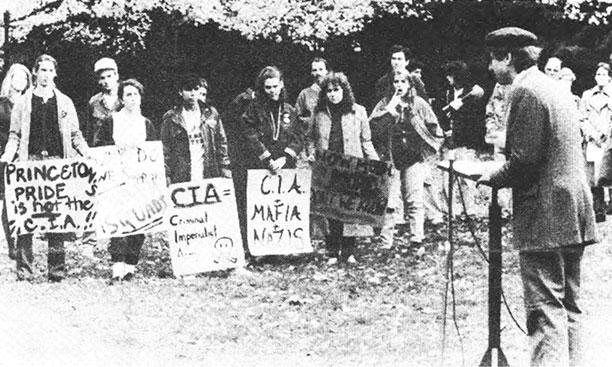
“PROTEST THE CIA.” The heyday of campus political activism was long past when, on Oct. 24, 1988, Students for Social Responsibility issued this call in The Daily Princetonian. It was amplified by a letter to the editor in which Geoffrey Ng ’92 assured readers that “to intimidate and harass individuals would be counterproductive to our cause.”
The individuals in question were recruiters from the Central Intelligence Agency and students eager to join its ranks. But when a modest crowd gathered in front of McCormick Hall, a different line was drawn: between demonstrators and counter-demonstrators, whose competing placards (“CIA = Criminal Imperialist Army” and “Don’t Insult Intelligence — Support the CIA”) captured the tension between foes and friends of the country’s best-known spy agency.
Although, as the Prince reported, the protest “seemed vaguely reminiscent of the ’60s” — complete with a rendition of Bob Dylan’s “Blowin’ in the Wind” — old indictments of covert operations in other countries, from Iran to Chile, were coupled with a newer concern that ultimately prompted the University to change its guidelines for recruiters.
One speaker at the protest, Greg Christianson ’89, president of the Coalition Against Homophobia, accused the CIA of discrimination based on sexual orientation, equating its position to an employer saying, “We don’t discriminate against blacks; we just don’t hire them.” In an op-ed published the next day, he urged the University to insist that all recruiters sign a document attesting that their organizations “do not discriminate on the basis of religion, national origin, race, sex, and sexual orientation.”
Two weeks later, the University announced that it would add “sexual orientation” to the non-discrimination statement by which recruiters were expected to abide. And within a month, the CIA signed on, although, as Christianson unhappily noted, the agency’s own hiring policy, which it submitted with the form, would permit sexual orientation to remain “a relevant consideration” in the recruitment process. Controversy flared anew, leading in 1989 to the temporary exclusion of CIA recruiters from campus.
John S. Weeren is founding director of Princeton Writes and a former assistant University archivist.
